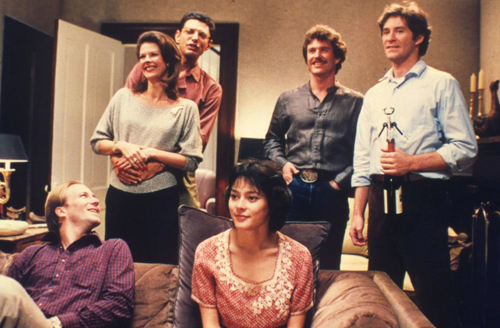Like most films, Lawrence Kasdan’s 1983 film The Big Chill is a product of its time. And yet there’s a wistful yearning for the past in the story of a group of college friends who reunite after one of them commits suicide.
A warmer kind of Chill

Like most films, Lawrence Kasdan’s 1983 film The Big Chill is a product of its time. And yet there’s a wistful yearning for the past in the story of a group of college friends who reunite after one of them commits suicide.
There’s a reason the film’s famous soundtrack is made up entirely of iconic songs from the 1960s, from Motown hits to the Rolling Stones: In the early ’80s, hippies and flower children were in their 30s, facing careers and parenthood and an increasingly commercial and technological world.
The loss of youth, the loss of passion and ideals and especially the loss of hope all inspired the film’s title. The Big Chill is literally about the fear of turning cold.
It’s ironic, then, that the opening credits feature the body of Alex, the member of the group who has just slashed his wrists in the guest-house bathroom of his friends Sarah and Harold Cooper, played by Glenn Close and Kevin Kline, respectively.
The trivia behind this sequence is well-known. Alex is played by a young Kevin Costner,whose face is never shown on screen. Costner also filmed several flashback scenes as Alex, but they were cut from the final film, and Kasdan has refused to let the footage be shown to this day.
Still, the fact that we never see Alex actually works so much better. His presence is strongly felt throughout the film; through the anecdotes of the other characters, it’s easy to get an idea of who he was.
Sarah and Harold are the hosts of Alex’s funeral reception, which is attended by several of their college friends—a veritable master list of great 1980s actors. Jeff Goldblum is the cynical People Magazine writer, Michael. Mary Kay Place plays Meg, the disillusioned lawyer who wants to have a baby.
Tom Berenger is Sam, now a famous television actor. JoBeth Williams is Karen, who brings along her stodgy husband, Richard (Don Galloway). William Hurt plays Nick, a Vietnam vet rendered impotent who has become a drug dealer. And Meg Tilly is Chloe, Alex’s younger girlfriend, who discovered his body.
The film explores the various relationships and history between the characters, and it includes several discussions of adulthood, cynicism and whether life is as meaningful as it once was.
Much of their reminiscing turns to the topic of Alex, who is revealed to have been a physics prodigy who turned his back on his potential and wandered through life aimless and unhappy.
The idea that Alex was never fully able to grasp how to make it in the “cold world” is ever-present and serves as a trap that any of them could have fallen into.
At the dinner table, the friends lament all the ambitions they had in college that never came to fruition. Harold wonders if all their talk means, “We were great then, but we’re shit now.”
Sentimentality is a big threat to The Big Chill, and it can sometimes seem hokey and dated. Dancing around the kitchen to “Ain’t Too Proud to Beg” almost seems beneath the film’s more poignant and intelligent themes, and yet it’s probably the most famous scene.
But there’s something about this film that just resonates, and it is an incredible portrait of a moment in time.
I’ve loved this film for years, and I can’t even say why: It could be because my parents were disillusioned hippies, or maybe because it says something profound about growing up, and the even more difficult process of getting older.
While all of the characters are immensely likeable (except for Karen, who seems to exemplify the weakness they’re afraid of), Hurt’s Nick is the best and strongest presence in the film.
The similarities between Nick and Alex are alluded to many times, and like Alex, Nick is a cynical and wounded man who may be spiraling out of control.
If there was a death pool for who’d be next in that group, Nick would certainly be the one to put your money on, and yet he proves himself capable of redemption in the most understated of ways.
When Chloe says he reminds her of her late boyfriend, Nick plainly states, “I ain’t him.” Although he’s much colder than the others, his coldness is actually refreshing.
I would have loved a whole movie just about this character and the slow unraveling and rebuilding of his emotional life. It’s one of Hurt’s finest performances.
I could probably write a book on how much I love movies from the ’80s. It was probably the last great decade for imagination, originality, passionate storytelling and that blend of commercial and quality filmmaking.
But there are few movies from that decade that accurately represent what life was like as well as The Big Chill does. At the start of a decade filled with big, brazen movies, this is introspective storytelling at its best.
Remember Ally Sheedy in The Breakfast Club? She said, “When you grow up, your heart dies.”
The characters in The Big Chill came from a generation of people who believed that. And yet the struggle to keep your blood warm just a little longer is one that everybody faces, in some form or another.





